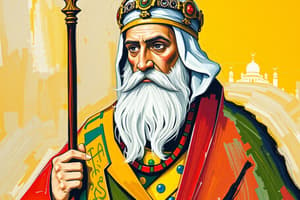Podcast
Questions and Answers
What was Umar Ibn Khattab known for in Islamic history?
What was Umar Ibn Khattab known for in Islamic history?
- His literary contributions to Islamic texts
- His proficiency as a successful merchant
- His exceptional leadership skills (correct)
- His military conquests in Europe
What event prompted Umar's conversion to Islam?
What event prompted Umar's conversion to Islam?
- A military defeat
- An illness
- A loss in a trade deal
- A profound spiritual awakening (correct)
How did Umar contribute to the Muslim community after embracing Islam?
How did Umar contribute to the Muslim community after embracing Islam?
- He distanced himself from Prophet Muhammad
- He offered his wealth and resources to support the growing Muslim community (correct)
- He withdrew from society completely
- He focused solely on expanding his commercial ventures
What position did Umar Ibn Khattab hold in the Muslim community after the death of Prophet Muhammad?
What position did Umar Ibn Khattab hold in the Muslim community after the death of Prophet Muhammad?
For what is Umar Ibn Khattab revered in governance and justice?
For what is Umar Ibn Khattab revered in governance and justice?
Which administrative system introduced by Umar helped in the consultative decision-making process?
Which administrative system introduced by Umar helped in the consultative decision-making process?
What was the significance of Umar's conversion to Islam?
What was the significance of Umar's conversion to Islam?
Which area did Umar make significant contributions to besides leadership and governance?
Which area did Umar make significant contributions to besides leadership and governance?
What was one of Umar's achievements that expanded the borders of the Muslim community?
What was one of Umar's achievements that expanded the borders of the Muslim community?
Which system introduced by Umar aimed to protect non-Muslims residing in Muslim lands?
Which system introduced by Umar aimed to protect non-Muslims residing in Muslim lands?
Flashcards are hidden until you start studying
Study Notes
Umar Ibn Khattab: From Caliph to Legendary Leader
Umar Ibn Khattab, often referred to as Umar or Umar ibn al-Khattab, was a pivotal figure in Islamic history, known for his unwavering dedication to the faith and his exceptional leadership skills. Born around 583 CE in Mecca, Umar's journey from a successful merchant to the second Caliph of the Muslim community spanned over six decades, and his influence continues to be felt throughout the world today.
Life and Leadership
Umar's life reflected a remarkable transformation, from a wealthy and influential merchant to a dedicated Muslim and commander of the Islamic armies. At the height of his commercial success, Umar experienced a profound spiritual awakening. He embraced Islam and became a staunch supporter of Prophet Muhammad, offering his wealth and resources to the growing Muslim community.
Upon the death of the Prophet Muhammad, Muslims gathered to elect a successor from among the Prophet's closest companions. Umar's leadership qualities were recognized, and he was elected as the second Caliph of the Muslim community, a position he held from 634 to 644 CE. As Caliph, Umar continued to spread the message of Islam while simultaneously building a formidable military and administrative infrastructure across the Middle East.
Justice and Governance
Umar is revered for his unparalleled commitment to justice and transparency in governance. His efforts resulted in the establishment of legal systems and administrative structures that helped to unify the Muslim community and maintain peace and order. He introduced the dhimma, a pact of protection for non-Muslims residing in Muslim lands, ensuring their safety and the protection of their property.
Umar initiated the hilāl (currency) system, which standardized the exchange of goods and facilitated trade throughout the Muslim world. He also implemented the shūrā system, a form of consultative decision-making, which allowed for the involvement of key advisors and consultants in the Caliph's deliberations.
Conversion to Islam
Umar's conversion to Islam was a pivotal moment in Islamic history. His acceptance of the faith in 616 CE, just over a decade after the founding of the Muslim community, was a tremendous boost to its growth and development. Umar's financial and military support for the Muslim community was crucial in the early years of Islam, and his conversion inspired many influential Meccans to follow suit.
In one of the most famous anecdotes of his conversion, Umar heard Prophet Muhammad reciting verses from the Qur'an. Impressed by the Prophet's eloquence and sincerity, Umar asked him to interpret a particular verse. When the Prophet explained the meaning, Umar declared his conversion on the spot.
Contributions to Islam
Umar's contributions to Islam are numerous and far-reaching. In addition to his leadership and governance achievements, Umar made significant contributions to the development of Islamic jurisprudence and theology. He is regarded as one of the earliest scholars of Islamic law and played a vital role in the compilation of the Qur'an and the codification of Islamic law.
Umar's military campaigns expanded the borders of the Muslim community, and his administrative and logistical skills ensured that the Muslim armies were well-equipped and highly disciplined. His peace treaties with neighboring kingdoms and his establishment of religious foundations and endowments were instrumental in stabilizing the nascent Muslim state.
In conclusion, Umar Ibn Khattab was a remarkable figure in Islamic history, recognized as a just and visionary leader. His contributions to justice, governance, and the growth of Islam are legendary and continue to inspire generations. Umar's legacy lives on through the enduring principles of faith, justice, and unity that he embodied throughout his life.
Studying That Suits You
Use AI to generate personalized quizzes and flashcards to suit your learning preferences.




